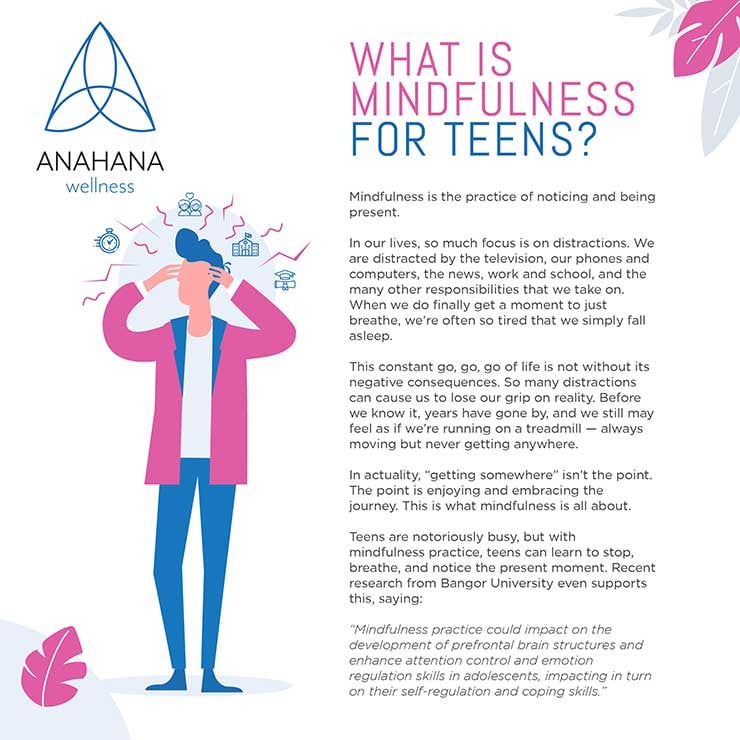6
Mindfulness For Teens
Last Updated: December 15, 2024

Table of Contents
Want to help your teen become more present, reduce stress, and relax more? Mindfulness could be the answer.
Key Takeaways
- A mindfulness-based education program can help teens develop emotional competence and manage stress.
- Practicing slow breath and taking a mindful walk fosters calm and relaxation.
- When practiced regularly, mindfulness enhances focus, reduces anxiety, and improves emotional regulation.
- The benefits of mindfulness include better sleep, concentration, and overall well-being.
- Parents and teachers can teach mindfulness through activities like guided meditation.
What is Mindfulness For Teens?
Mindfulness is the practice of noticing and being present. These days, we’re constantly surrounded by distractions. We are distracted by the television, our phones and computers, the news, social media, work and school, and the many other responsibilities that we take on. When we finally get a moment to breathe, we barely have the headspace for anything but sleep.
This constant go, go, go of life is not without negative consequences. An enormous amount of distractions can cause us to lose our grip on reality. Years have gone by before we know it, and we still may feel as if we’re running on a treadmill — always moving but never getting anywhere.
In reality, “getting somewhere” isn’t the point.
Eventually, our minds and bodies get tired and overwhelmed by the grind culture. It manifests in the body with physical injuries, our mental health declines, both adults, kids, and teens become less aware and focused. Many fall into a depressive state or experience a sleep disorder.
What is Mindfulness?
In a nutshell, mindfulness is about being and living in the present moment, with self-awareness and the ability to process emotions and experiences as life presents them. Mindfulness skills can be developed in kids and young adults from a very early age, and it comes down to parents and teachers to introduce youth to the mindfulness practices that they can apply at school, in the classroom, or when making friends.
How Can Mindfulness Benefit Teens?
Teens are notoriously busy, but there is an opportunity for them to learn to stop, breathe, and notice the present moment with mindfulness practice. Recent research from Bangor University even supports this, saying:
“Mindfulness practice could impact the development of prefrontal brain structures and enhance adolescents' attention control and emotion regulation skills, impacting their self-regulation and coping skills.”
The middle and high school years can be beautiful moments in our lives. Lasting friendships are built. Hobbies turn into passions. And so much learning and growth take place. Still, these years are not accessible in many ways and can come with a pinch of salt.
Here’s how mindfulness can help:
1. Better Sleep.
Mindfulness promotes better sleep because it promotes relaxation, and we need to relax our bodies and minds to fall into a deep sleep. It also helps sleep because it restructures the constant stream of thoughts, worries, and stressors that often plague us right before bed. With mindfulness meditation, you can slow down your thinking and simply focus on the present moment. This centeredness will help you drift off much more effortlessly.
2. A Calming Force.
The challenge for mindfulness is to be present for your experience as it is rather than immediately jumping in to change it or trying to force it to be different.
People who practice mindfulness are notably calmer. Calmness is an inherent byproduct of mindfulness because mindfulness practice slows everything down.
Notice your thoughts and attention on a typical day when you are not practicing mindfulness. In all likelihood, your thoughts are fast-paced, fleeting, and jittery. Mindfulness forces your thoughts to slow motion, relaxing your heart rate and quieting your constant stream of judgments.
3. Improved Concentration.
Mindfulness is about following your consciousness and noting every thought, emotion, or feeling that crosses your mind. It’s about living in the present moment and not getting lost in the past or future. Doing this time and again during mindfulness practice will inevitably bleed into your daily consciousness and improve your ability to concentrate.
4. Less Outward Focus.
When we aren’t practicing mindfulness, we’re practicing mindlessness. A mindless state is one in which our focus is on outward stimuli. We are constantly reacting to life instead of harnessing our inner awareness. The practice of mindfulness can help teens, in particular, stop expending so much mental energy on the world around them. It can help us all turn inward for solace and calm.
Tips for Helping Your Teen With Mindfulness
Lead by Example
Often, telling teenagers to do something is the “kiss of death.” Instead, show, don’t tell. Lead by example. Practice mindfulness in your daily life, and incorporate mindfulness meditation into your routine. Trust that the effects will indeed reach your teen.
Practice Together
Practicing mindfulness as a family can benefit everyone and be a great bonding experience. Choose a time of day to participate in a mindfulness activity, or if you’ve already established a meditation practice for your family, consider infusing mindfulness into the mix.
Remember, perfection is not the goal.
As you help your teen with mindfulness, remember that the goal isn’t to have a “perfect practice.” There is no such thing as a perfect practice. Instead, simply teach your teen to find time to be mindful whenever they can — at the dinner table, in the car, waiting in line, or in the morning before school and work. Even stopping and taking a deep breath when things get stressful is a helpful step in the right direction. It’s all “grist for the mill.”
The Importance of Gratitude
 Gratitude is often called the “forgotten virtue.” We are quick to complain but slow to give thanks. And yet, it is one of the most important virtues when it comes to mindfulness and happiness. Why?
Gratitude is often called the “forgotten virtue.” We are quick to complain but slow to give thanks. And yet, it is one of the most important virtues when it comes to mindfulness and happiness. Why?
Gratitude helps us shift our focus from what we lack to what we have. It allows us to appreciate the good in our lives, even during difficult times. It also strengthens our relationships and creates a sense of community. When we feel grateful for what others have done for us, we are more likely to help them.
Finally, it has been shown to increase our overall well-being and life satisfaction. People who practice gratitude report feeling happier.
Staying Positive
It is so important to stay positive. Positivity creates happiness, good health, and success. Negativity breeds fear, hatred, depression, and misery. It’s essential that we learn how to control our thoughts and focus on the positive if we want to live happy, fulfilling lives. Here is where students and teens learn how powerful mindfulness training can truly be.
The first step to staying positive is acknowledging that your thoughts create your reality. What you think about manifests in your life. If you want to change your life, you have to change your thoughts.
The second step is eliminating negative thoughts as soon as they pop into your head. This takes practice, but it’s worth it! Every time you catch yourself thinking a negative thought, replace it with a positive one.
The third step is to practice gratitude. Be thankful for what you have, even if it’s not perfect. Gratitude creates more happiness and success in life. Keeping a gratitude journal could make the practice easier.
The fourth step is to take action towards your goals. Don’t just sit around and wait for things to happen – make them happen! Be bold and go after what you want in life with the help of a mindfulness program.
Teaching Mindfulness to Teens
So how can we go about incorporating mindfulness training into a teen's everyday life? The first step is to make sure they understand what mindfulness for teens is and why it’s important. Once they know that, you can do a few different exercises to help them practice mindfulness.
One popular exercise is guided meditation. This involves sitting quietly and focusing on your breath while listening to a recorded voice that guides you through the meditation. This can be very helpful for beginners who need help keeping their focus on their breath.
Another good exercise is called the body scan meditation. This involves lying down and slowly scanning your body from head to toe, paying attention to any sensations you feel along the way. This helps you become more aware of your body and can be very relaxing.
There are many other mindfulness exercises, so feel free to experiment and find what works best for you! The important thing is to keep practicing – the more you do it, the better you’ll get at it. These are but two of the mindfulness resources that are available for teens.
Mindfulness for Teens: Frequently Asked Questions
How do you explain mindfulness to a teenager?
It’s not easy to explain mindfulness to anyone, let alone teenagers. Therefore, with teens, you want to show what’s in it for them. In other words, explain mindfulness as a way to cope better with difficult emotions they may be experiencing. If they are feeling stressed, over-worried, or anxious, mindfulness is a tool they can use anywhere, anytime to combat these challenging feelings.
What are some mindfulness activities for teens?
It can be a bit more of a challenge to develop mindfulness activities for teens who may or may not be interested. For this reason, it can be a good idea to incorporate mindfulness into activities that you already do as a family. For example, at dinner, try incorporating the practice of mindful eating. Go for a mindful walk as a family. Or, allow for quiet time in the evening at home. Limit the use of screens and technology, and make homework time more mindful by limiting music and other distractions.
How do you talk to a teenager that doesn’t want to talk?
If your teen is challenging to talk to at times, remember that this is usually just a phase. Second, be a listener when you can talk to your teen (even if it’s just for a few minutes). Resist the urge to jump in with advice at every turn. Additionally, go with the flow of the conversation. If your teen laughs or smiles, laugh and smile with them. If they ask for help, then, by all means, offer your advice. If not, just being a good listener can benefit them and your relationship.
The Miracle of Mindfulness Could Change Your Teen’s Life
Teenagers deserve to enjoy their youthful years. This period should be learning, growing, exploring, and being creative. Stress and anxiety should be reduced as much as possible.
If you are a teen who is struggling with stress or anxiety or if you have a teen in this situation, Anahana’s Unwind Your Mind streaming service can help.
With this short introduction to breathing exercises, gentle movements, and simple visualization techniques, you’ll feel better in just 25 minutes. You need a quiet place to go for 25 minutes and your phone or computer.

References
Mindfulness meditation helps fight insomnia, improves sleep - Harvard Health
Disclaimer
The contents of this article are provided for informational purposes only and are not intended to substitute for professional medical advice, diagnosis, or treatment. It is always recommended to consult with a qualified healthcare provider before making any health-related changes or if you have any questions or concerns about your health. Anahana is not liable for any errors, omissions, or consequences that may occur from using the information provided.

Dr. Darlene Buan-Basit is a highly experienced licensed Chiropractor and Pilates instructor with expertise in many techniques, including Medical Acupuncture, Traditional Chinese Medicine, and Advanced Massage Techniques.
